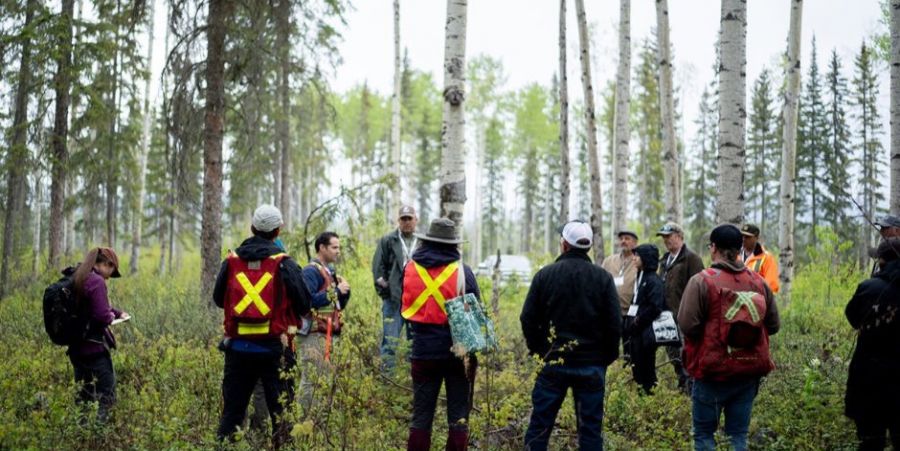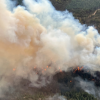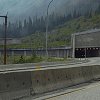British Columbia’s forestry sector has been under immense pressure over the past few years but the provincial government announced changes to the role of BC Timber Sales (BCTS).
Forests Minister Ravi Parmar said BC’s forestry industry has faced significant challenges including climate change, intense wildfire seasons, a changing market and uncertainty due to changing trade relationships with the US and tariffs.
Last month, the US finalized 35.19% duties on softwood lumber exported from Canada.
"In this uncertain time, we're giving BCTS the tools to meet this critical moment head on,” Parmar said.
“This is about taking action to support a thriving forest economy and deliver on the public interest for workers, towns, families and companies throughout the province."
In September 2024, Premier David Eby said the BC NDP were not satisfied with the path BCs forestry sector was headed down. In an interview with NowMedia, he blamed pine beetle kill, forest fires, high lumber prices and a “massive” increase in duties for bringing wood into the US.
His comments came after half a dozen sawmills had closed in BC over four months last year.
That includes Canfor operations in Prince George, Bear Lake, Houston, Vanderhoof and Fort. St. John and the temporary closure of Aspen Planers in Merritt last spring.
Canfor blamed the closure on a lack of access to fibre as well as the US tariffs while Aspen Planers’ parent company AP Group blamed the market conditions.
In total, about 1,000 jobs were impacted due to those curtailments. That is on top of the 10,000 forestry jobs lost in 2023.
The changes to BCTS that were announced on Tuesday are the result of 54 recommendations from the BCTS Task Force review, which was appointed by Parmar earlier this year.
The 17-page report explained that BCTS operates in 33 communities in BC and manages and markets just under 20% of the timber on Crown lands.
One of the recommendations includes expanding the use of community forests, similar the one in Logan Lake, which “has shown that revenues generated from effective forest management can be reinvested into wildfire risk reduction and community preparedness.”
The province also announced on Tuesday that Vanderhoof, Fort St. James and Fraser Lake community forests would be expanded to allow those communities and nearby First Nations to manage and protect their forest resources.
 c
c
Other recommendations include auctioning commercial thinning sales that improve forest health, utilizing the expertise in BCTS to manage stewardship projects, making it easier for smaller companies to bid on auctions in groups, and building partnerships with First Nations communities.
The task force also recommended working toward doubling the dedicated fibre supply for value-added wood manufacturing companies to 20% of BCTS forestry licences; and developing methods to market and sell logging residuals, such as branches and tree tops, to support sectors, such as the pulp sector.
The Ministry of Forests said it is taking immediate action to support the expanded mandate of BCTS and implementation of the recommendations from the task force.
The ministry said many actions are underway and others will be achieved through “a phased approach.”
"The forest industry and the many communities that depend on it are under great stress today," said George Abbott, a former MLA and a member of the BCTS review task force.
"The task force did its best to identify solutions that might strengthen the industry and communities in the longer term, with or without punitive trade actions from the south."
(1).jpg)
Abbott was joined by Brian Frenkel, a Vanderhoof city councillor; and Lennard Joe, chief executive officer of the First Nations Forestry Council.
They met with 50 groups and individuals, held two virtual engagement sessions, and received more than 300 submissions from January to July 2025.
Frenkel said communities are on the front lines of both the benefits and the risks of timber sales.
“Their voices must remain central to shaping BCTS's future,” he said.
Joe said the review was not simply about forestry policy but rather about people, communities, and the forests that sustain the province.
“The report and recommendations envision a renewed relationship between government, the sector, and First Nations - one that is rooted in collaboration, shared decision-making and long-term stewardship,” he said.
The BC Council of Forest Industries (COFI) said it was pleased to see harvest targets in recommendation 17, which includes harvest targets of a minimum of 6 million cubic metres in 2026 and increasing by 1 million cubic metres per year until 2029.
However, the council said the proposal is not ambitious enough to meet the government’s Major Project commitment to reach a 45 million m³ harvest.
“While BCTS has consistently underperformed in its core function of delivering wood supply to the market, the government is choosing to expand its mandate and propose additional volumes be allocated to BCTS,” said Kim Haakstad, president & CEO of the COFI.
“Without tackling these underlying issues, additional responsibilities risk compounding challenges rather than resolving them.”
However, the COFI said it looks forward to continued collaboration to ensure the forestry sector can provide stability.








 c
c(1).jpg)








